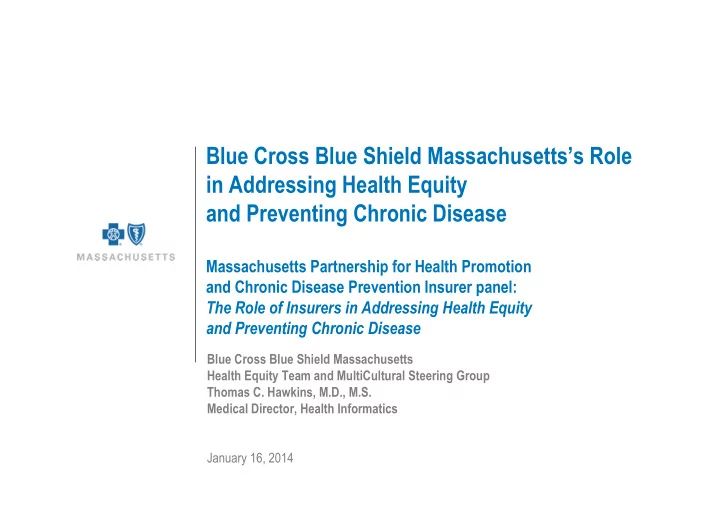

Blue Cross Blue Shield Massachusetts’s Role in Addressing Health Equity and Preventing Chronic Disease Massachusetts Partnership for Health Promotion and Chronic Disease Prevention Insurer panel: The Role of Insurers in Addressing Health Equity and Preventing Chronic Disease Blue Cross Blue Shield Massachusetts Health Equity Team and MultiCultural Steering Group Thomas C. Hawkins, M.D., M.S. Medical Director, Health Informatics January 16, 2014
Our role, and a starting point: Access • Our primary role in disparity mitigation is to utilize our data, and clinical/analytic and multi-cultural expertise, in close partnership with our employer customers, to move towards mitigation. • Race and ethnicity data, actual, or inputed, and geographic data, is used to identify disparities in primary care access, cancer screening, condition rates, ER use, and next, member satisfaction. • Access to culturally competent primary care is an important determinant of other healthcare disparities – those more difficult to mitigate without a usual source of primary care and a community health resource. We begin with attempting to mitigate gaps in access to primary care, and have used the Well Visit Rate as a measure of a substantive primary care relationship and disparities. Blue Cross Blue Shield of Massachusetts 2
BCBSMA Role: Using Analytics and Population Health Expertise to Drive Health Equity Improvements Analytics • Opportunity/gap identification • Standardized quality metrics • Evaluation Interventions • Population and Individual Level • BCBSMA, Employer, and Reporting | Presentation Community involvement • Accounts • Providers • BCBSMA Customer Service • Marketing materials • Segments Blue Cross Blue Shield of Massachusetts 3
Preliminary Employer-specific Disparities Data • Two disparity categories, from a broader set, follow on two slides: 1. Access 2. Chronic Conditions • Some national disparities persisted among this employed population, and others diminished in specific populations and regions/worksites. There were also gender differences. • Standard race/ethnicity roll-up methodologies mask many known and important population variations – but they are often the only self-reported categories we receive, and are needed for comparative statistical power. Blue Cross Blue Shield of Massachusetts 4
One Employer’s Access Disparities Colorectal cancer screening, cervical cancer screening, and well visits are much lower in African Americans and Hispanics compared to Caucasians. Gender differences also exist. African American F African American M Asian F Asian M Caucasian F Caucasian M Hispanic F Hispanic M % of Members % of Members % of Members % of Members with with Comprehensive with Breast Cancer with Colorectal Exam Cervical Screen Check-up Screening Blue Cross Blue Shield of Massachusetts 5
One Employer’s Condition Disparities Among the four chronic conditions below, Hispanics and African- Americans have the highest rates when compared to Caucasians BSC Condition Rates by Race 25.0 African 20.0 American Percent 15.0 Asian 10.0 Caucasian 5.0 Hispanic 0.0 Obesity Hypertension Diabetes CAD Note the Asian-American High Diabetes, Low Obesity Rates Blue Cross Blue Shield of Massachusetts 6
Disparities in Access and Obesity/Diabetes • Analytics are the easy part – mitigating disparities in access takes more than translations and listing phone numbers of available culturally competent clinicians. The cultural, economic, trust, and transportation issues are critical - and benefit from local knowledge and outreach by culturally-savvy community health workers – such as those used by the BWH Primary Care Access project. • Our top chronic condition disparity, obesity/pre-diabetes (gateway to diabetes and many other conditions), requires more than improved access to culturally competent primary care – steps outlined on the following slide. Access is, however, a critical component. • All populations are struggling with obesity/diabetes - although obesity/diabetes health equity plays out in African American, Hispanic, and Asian populations (latter with high diabetes rates without high ‘obesity’ rates) where focus is needed, Caucasians have the largest aggregate burden of obesity/diabetes. We need to be thoughtful, as disparities can be heavily confounded by income and education, and racial and ethnicity categorization is becoming more difficult over time. Blue Cross Blue Shield of Massachusetts 7
BCBSMA Taking Action • We develop disparity analytics for the employer, then work with cultural leaders and Employee Resource Groups to discuss what approach might work best in their population and locations – they know the population and culture and localities best. • For more complex disparities such as nutrition and exercise, obesity, and access to care, identify savvy, trusted ‘navigators’ who know the local population and healthcare workers, and can connect employees, healthcare workers, and the employer • For more dispersed populations, leverage BCBSMA assets including culturally competent nurses and culturally appropriate communications and education strategies – cancer screening and nutrition disparities, and some aspects of access. • Begin with achievable, measurable initial steps on the initial path to obesity/diabetes rate reductions - mitigating obesity/pre-diabetes is complex task, given the multiple influences over long periods of time. Steps include engagement in health education that is culturally relevant, healthy eating, increased physical activity – as you have outlined in your Community of Practice approach. Blue Cross Blue Shield of Massachusetts 8
BCBSMA Taking Action • We leverage the workplace, as it presents a tremendous opportunity to access communication channels, healthy culture influences, peer support, nutrition/physical activity, and some preventive services. We view employers as critical allies in the drive for health equity. • BCBSMA supports organizations across the Commonwealth dedicated to supporting healthy lifestyles and chronic disease prevention through funding either specific programs or general operating assistance - through our Corporate Citizenship program. • We applaud you for your efforts to invigorate these Community-Clinical linkages, and look forward to leveraging our commercial employer collaboration with your public and community strategies. Blue Cross Blue Shield of Massachusetts 9
Recommend
More recommend